
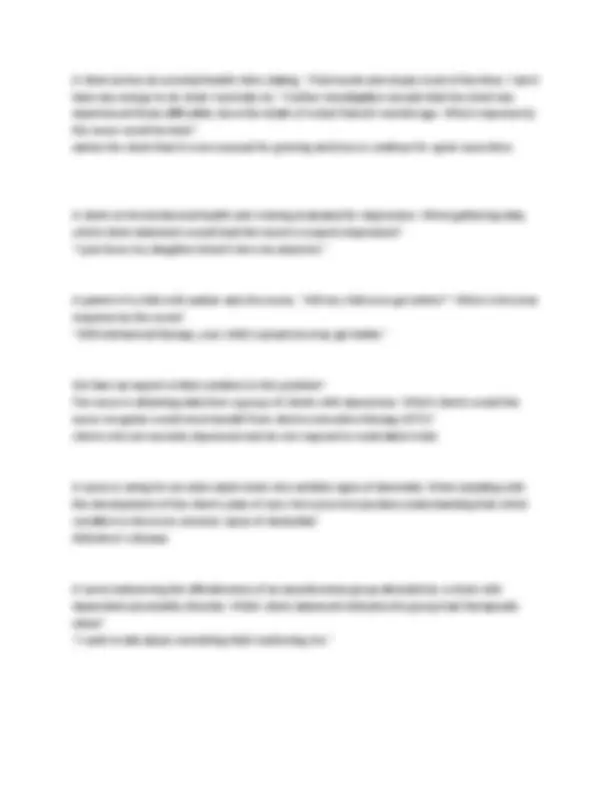
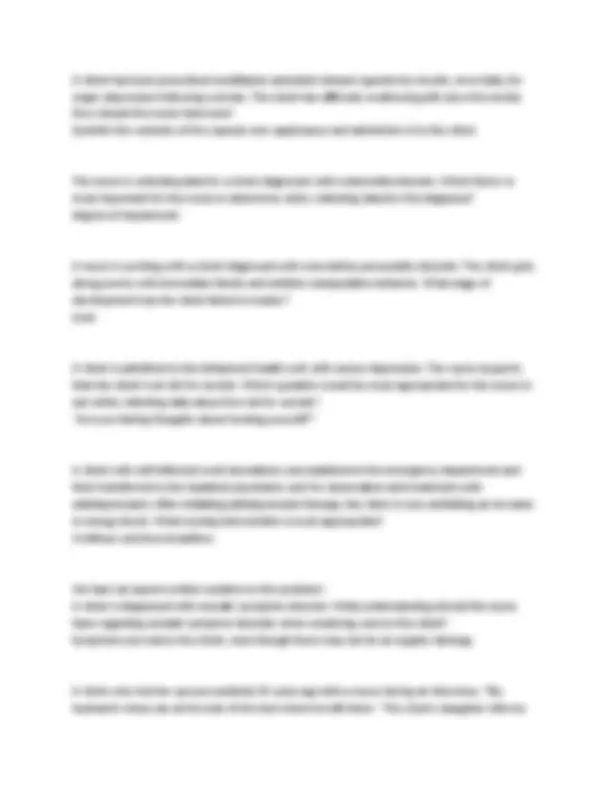
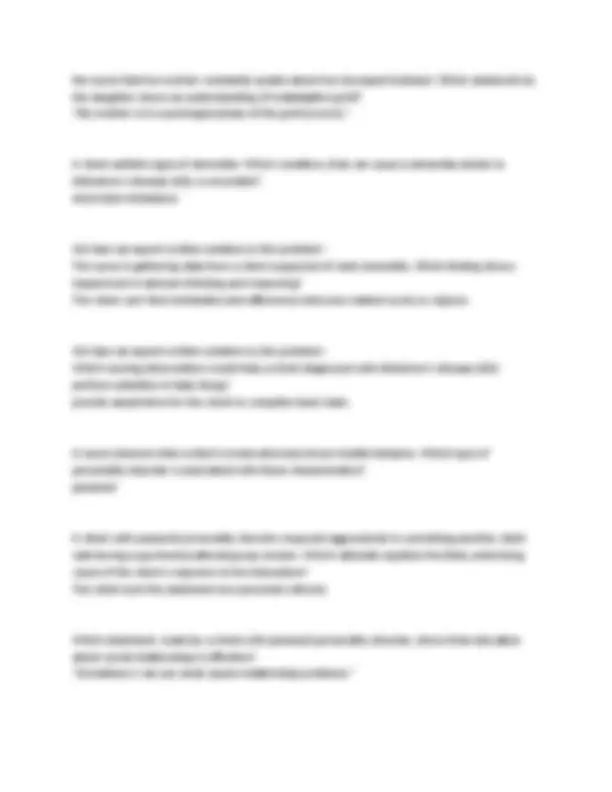
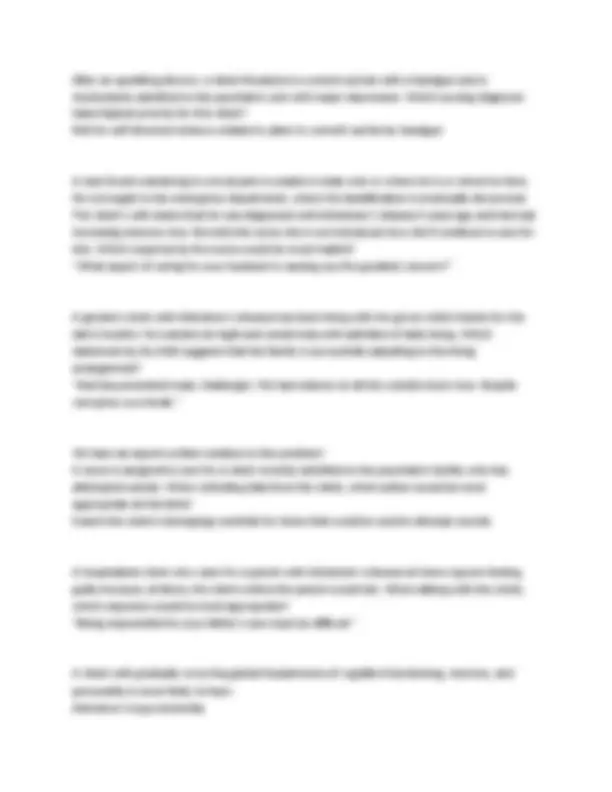
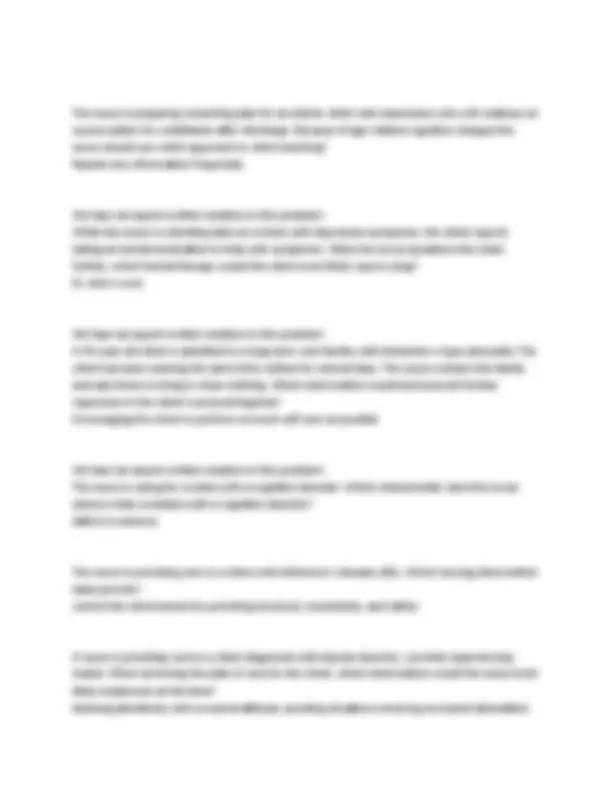
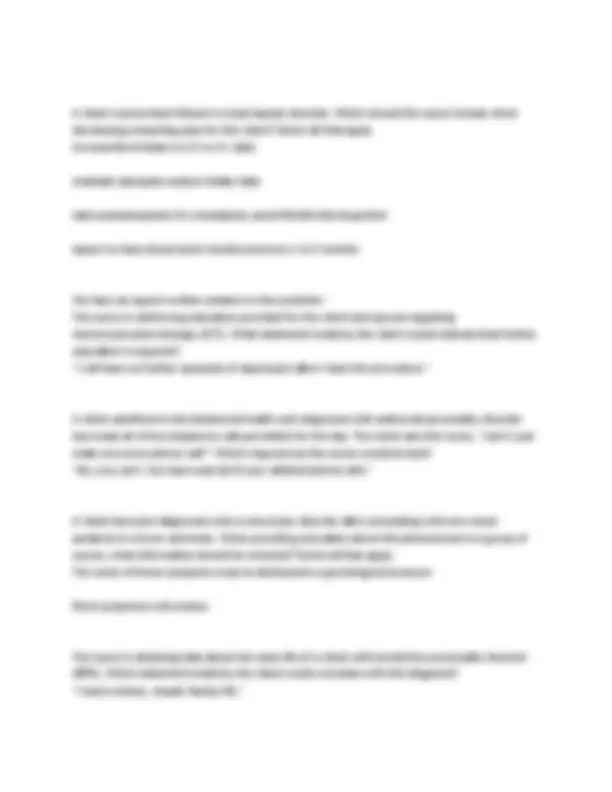
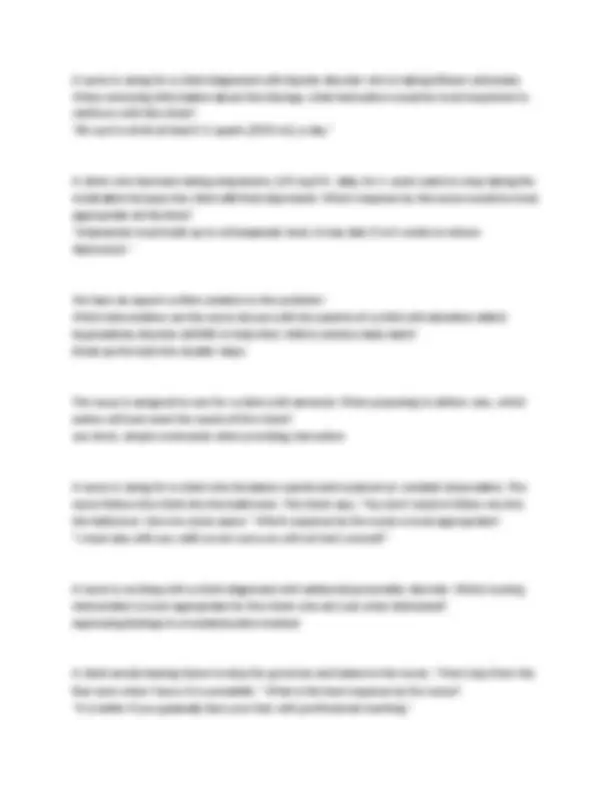
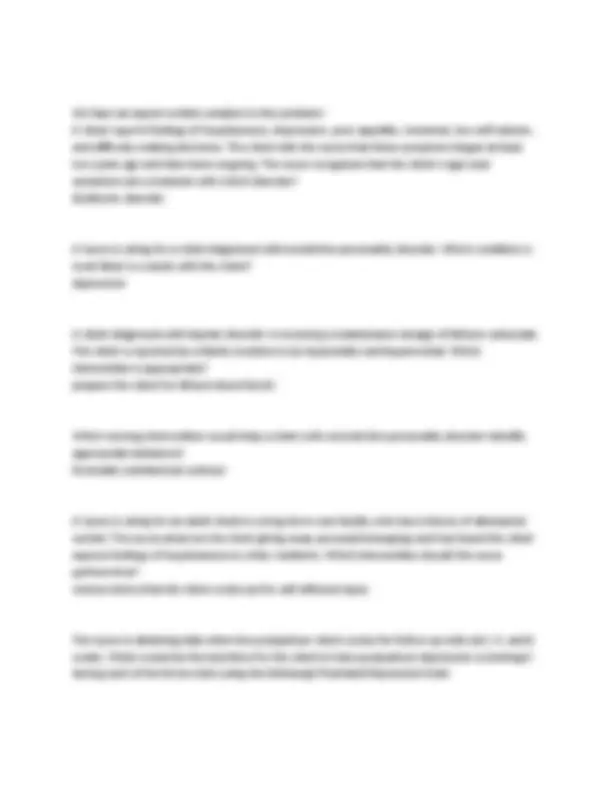
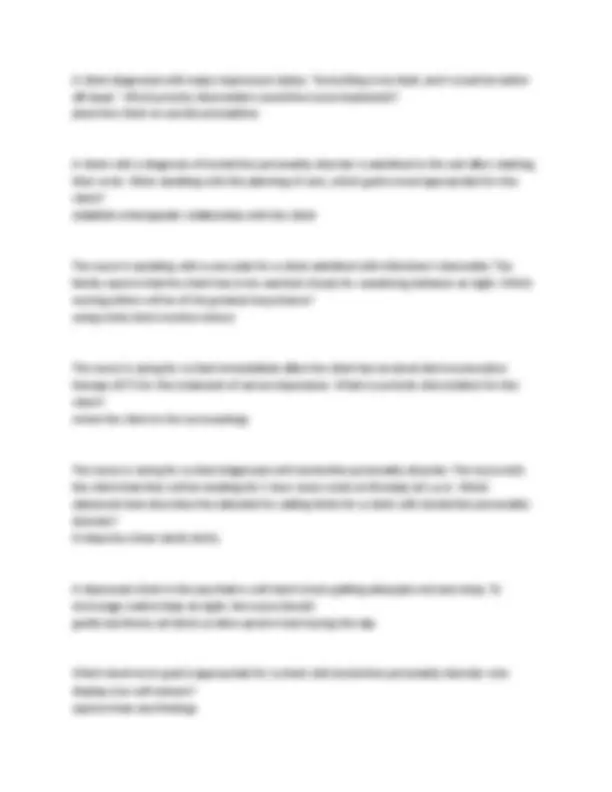
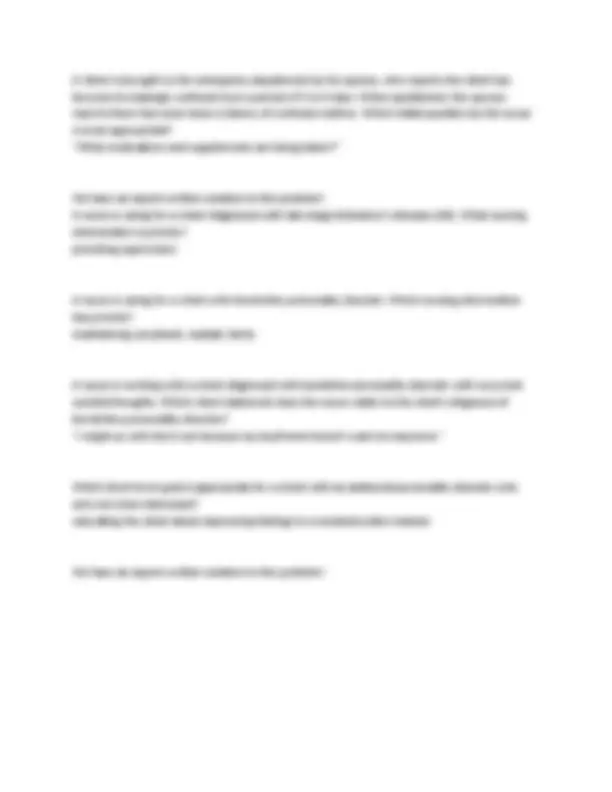


Study with the several resources on Docsity

Earn points by helping other students or get them with a premium plan


Prepare for your exams
Study with the several resources on Docsity

Earn points to download
Earn points by helping other students or get them with a premium plan
Community
Ask the community for help and clear up your study doubts
Discover the best universities in your country according to Docsity users
Free resources
Download our free guides on studying techniques, anxiety management strategies, and thesis advice from Docsity tutors
RNSG 1533 PASSPOINT MOOD ADJUSTMENT AND DEMENTIA DISORDERS EXAM REVIEW- ALL EXAMS One day after being admitted with bipolar disorder, a client becomes verbally aggressive during a group therapy session. Which response by the nurse would be therapeutic? "You're disturbing the other clients. I'll walk with you around the patio to help you release some of your energy. We have an expert-written solution to this problem! A client with depression doesn't respond to drug therapy. At a team conference, staff members recommend electroconvulsive therapy (ECT). The nurse knows that most people respond negatively to the thought of an electric current passing through the brain. Therefore, when discussing ECT with the client, the nurse should: refer to the procedure as a "treatment" instead of "shock therapy."
Typology: Exams
1 / 18

This page cannot be seen from the preview
Don't miss anything!











One day after being admitted with bipolar disorder, a client becomes verbally aggressive during a group therapy session. Which response by the nurse would be therapeutic? "You're disturbing the other clients. I'll walk with you around the patio to help you release some of your energy. We have an expert-written solution to this problem! A client with depression doesn't respond to drug therapy. At a team conference, staff members recommend electroconvulsive therapy (ECT). The nurse knows that most people respond negatively to the thought of an electric current passing through the brain. Therefore, when discussing ECT with the client, the nurse should: refer to the procedure as a "treatment" instead of "shock therapy." An adolescent becomes increasingly withdrawn, is irritable with family members, and has been getting lower grades in school. After giving away a stereo and some favorite clothes, the adolescent is brought to the community mental health agency for evaluation. This adolescent is at risk for: suicide. We have an expert-written solution to this problem! A client is diagnosed with dependent personality disorder. When gather data from the client, which behavior would the nurse suspect as being most likely indicative of ineffective coping? inability to make choices and decisions without advice A client received treatment for depression for the past three weeks. The nurse determines that the treatment is effective based on observation of which behavior? The client talks about the difficulties of returning to college after discharge.
During the admission data collection, a client reports that she frequently has nightmares and memories of a rape that occurred 3 years ago. She feels depressed and asks the nurse, "Do you think I will ever get better? I don't know what is wrong with me." The nurse's most supportive response would be: "It sounds like you have some unresolved pain about the trauma. Take time here to talk and allow yourself to heal." An older adult client is prescribed fluoxetine, 40 mg by mouth twice per day, for treatment of depression. The client has difficulty swallowing, so the pharmacy dispenses the oral solution containing 20 mg/5 mL. How many milliliters of solution should the nurse administer to achieve the prescribed dose? Record your answer using a whole number. 10 A nurse is caring for a client who is acutely suicidal. When accompanying the client to the bathroom, what is the appropriate action by the nurse? maintain continuous observation of the client A nurse is caring for a client who states, "I can't keep living like this. I just want to end it all." What is the nurse's best response? "Do you plan to harm yourself?" We have an expert-written solution to this problem! A client taking metronidazole asks the nurse if it is okay to drink alcohol while taking this medication. What is the nurse's best response? "Abstain from alcohol while on the drug." We have an expert-written solution to this problem! A client has depression after the death of a child. After a suicide attempt, the client is admitted to the inpatient psychiatric unit. During the admission interview, the client reports no longer wanting to die. Which action would be most appropriate for the nurse? inspect the client's personal belongings for potentially dangerous objects
A client has been prescribed venlafaxine extended-release capsules by mouth, once daily, for major depression following a stroke. The client has difficulty swallowing pills since the stroke. How should the nurse intervene? Sprinkle the contents of the capsule over applesauce and administer it to the client. The nurse is collecting data for a client diagnosed with a dementia disorder. Which factor is most important for the nurse to determine when collecting data for this diagnosis? degree of impairment A nurse is working with a client diagnosed with a bordeline personality disorder. The client gets along poorly with immediate family and exhibits manipulative behavior. What stage of development has the client failed to master? trust A client is admitted to the behavioral health unit with severe depression. The nurse suspects that the client is at risk for suicide. Which question would be most appropriate for the nurse to ask while collecting data about the risk for suicide? "Are you having thoughts about hurting yourself?" A client with self-inflected wrist lacerations was stabilized in the emergency department and then transferred to the inpatient psychiatric unit for observation and treatment with antidepressants. After initiating antidepressant therapy, the client is now exhibiting an increase in energy levels. What nursing intervention is most appropriate? Continue suicide precautions. We have an expert-written solution to this problem! A client is diagnosed with somatic symptom disorder. What understanding should the nurse have regarding somatic symptom disorder when rendering care to this client? Symptoms are real to the client, even though there may not be an organic etiology. A client who lost her spouse suddenly 30 years ago tells a nurse during an interview, "My husband's shoes are at the side of the bed where he left them." The client's daughter informs
the nurse that her mother constantly speaks about her deceased husband. Which statement by the daughter shows an understanding of maladaptive grief? "My mother is in a prolonged phase of the grief process." A client exhibits signs of dementia. Which condition, that can cause a dementia similar to Alzheimer's disease (AD), is reversible? electrolyte imbalance We have an expert-written solution to this problem! The nurse is gathering data from a client suspected of early dementia. Which finding shows impairment in abstract thinking and reasoning? The client can't find similarities and differences between related words or objects. We have an expert-written solution to this problem! Which nursing intervention would help a client diagnosed with Alzheimer's disease (AD) perform activities of daily living? provide ample time for the client to complete basic tasks A nurse observes that a client is mistrustful and shows hostile behavior. Which type of personality disorder is associated with these characteristics? paranoid A client with paranoid personality disorder responds aggressively to something another client said during a psychoeducational group session. Which rationale explains the likely underlying cause of the client's response to the interaction? The client took the statement as a personal criticism. Which statement, made by a client with paranoid personality disorder, shows that education about social relationships is effective? "Sometimes I can see what causes relationship problems."
The spouse of a client diagnosed with vascular dementia asks the nurse if this is the same as having Alzheimer's disease (AD). Which response by the nurse is most appropriate? "There are similarities in the conditions but they are not the same condition." Parents of a 3-year-old child are concerned that the child displays signs of autism spectrum disorder (ASD). What symptoms observed and reported by the parents correlate with the diagnosis of ASD? Select all that apply. inflexible when scheduled routine changes an inability to maintain eye contact repeats words that are said repeatedly uses a flat tone when speaking The nurse is caring for a client with dementia. Which nursing action is the priority? maintaining optimal physical health A client who retired six weeks ago, has been diagnosed with an adjustment disorder with mixed anxiety and depression. What can the nurse reinforce to help the client adapt well to the stress? Select all that apply. Do something that gives you a sense of accomplishment. Find a support group geared toward your situation. Live a healthy lifestyle including a healthy diet and regular physical activity. The nurse is caring for a client who has been diagnosed with delirium. Which of the following is characteristic of delirium? Acute onset and lasts hours to a number of days
After an upsetting divorce, a client threatens to commit suicide with a handgun and is involuntarily admitted to the psychiatric unit with major depression. Which nursing diagnosis takes highest priority for this client? Risk for self-directed violence related to plans to commit suicide by handgun A man found wandering in a local park is unable to state who or where he is or where he lives. He is brought to the emergency department, where his identification is eventually discovered. The client's wife states that he was diagnosed with Alzheimer's disease 3 years ago and has had increasing memory loss. She tells the nurse she is worried about how she'll continue to care for him. Which response by the nurse would be most helpful? "What aspect of caring for your husband is causing you the greatest concern?" A geriatric client with Alzheimer's disease has been living with his grown child's family for the last 6 months. He wanders at night and needs help with activities of daily living. Which statement by his child suggests that the family is successfully adjusting to this living arrangement? "Dad has presented many challenges. We have alarms on all the outside doors now. Respite care gives us a break." We have an expert-written solution to this problem! A nurse is assigned to care for a client recently admitted to the psychiatric facility who has attempted suicide. When collecting data from the client, which action would be most appropriate at this time? Search the client's belongings carefully for items that could be used to attempt suicide. A hospitalized client who cares for a parent with Alzheimer's disease at home reports feeling guilty because, at times, the client wishes the parent would die. When talking with the client, which response would be most appropriate? "Being responsible for your father's care must be difficult." A client with gradually occurring global impairments of cognitive functioning, memory, and personality is most likely to have: Alzheimer's-type dementia.
A client is prescribed lithium to treat bipolar disorder. Which should the nurse include when developing a teaching plan for this client? Select all that apply. increase fluid intake to 2.5 to 3 L daily maintain adequate sodium intake daily take acetaminophen for a headache; avoid NSAIDs like ibuprofen expect to have blood levels monitored every 1 to 3 months We have an expert-written solution to this problem! The nurse is reinforcing education provided for the client and spouse regarding electroconvulsive therapy (ECT). What statement made by the client would indicate that further education is required? "I will have no further episodes of depression after I have the procedure." A client admitted to the behavioral health unit diagnosed with antisocial personality disorder has made all of the telephone calls permitted for the day. The client asks the nurse, "Can't I just make one more phone call?" Which response by the nurse would be best? "No, you can't. You have used all of your allotted phone calls." A client has been diagnosed with a conversion disorder after presenting with new onset paralysis in a lower extremity. When providing education about this phenomena to a group of nurses, what information should be included? Select all that apply. The onset of these symptoms may be attributed to psychological stressors. Most symptoms will resolve. The nurse is obtaining data about the early life of a client with borderline personality disorder (BPD). Which statement made by the client would correlate with this diagnosis? "I had a violent, chaotic family life."
A home health care nurse is working with the family of a client who has Alzheimer's disease. The client's spouse is too exhausted to continue providing care alone and the client's adult children live too far away to provide relief on a weekly basis. Which nursing intervention would be most helpful? investigate community resources for adult day care and other services A client has been prescribed donepezil. What teaching reinforcement should the nurse add to a discharge plan of care? Select all that apply. May cause fainting or dizziness. Administer the medication on a regular schedule. Which foods are contraindicated for a client taking tranylcypromine? Chicken livers, Chianti wine, and beer Which nursing action is most appropriate when trying to diffuse a client's impending violent behavior? Helping the client identify and express feelings of anxiety and anger The nurse is caring for a client diagnosed with antisocial personality disorder. The client has a history of fighting, cruelty to animals, and stealing. Which trait would the nurse be likely to uncover during data collection? a low tolerance for frustration We have an expert-written solution to this problem! A client who was attempting to carry out a suicide plan is admitted to the unit. Which nursing intervention is the highest priority for this client? Making sure that a health care team member stays with the client
A nurse is caring for a client diagnosed with bipolar disorder who is taking lithium carbonate. When reviewing information about this therapy, what instruction would be most important to reinforce with this client? "Be sure to drink at least 2 ½ quarts [2500 mL] a day." A client who has been taking imipramine, 125 mg P.O. daily, for 1 week wants to stop taking the medication because the client still feels depressed. Which response by the nurse would be most appropriate at this time? "Imipramine must build up to a therapeutic level; it may take 3 to 4 weeks to reduce depression." We have an expert-written solution to this problem! Which intervention can the nurse discuss with the parents of a child with attention deficit hyperactivity disorder (ADHD) to help their child to achieve daily tasks? break up the task into smaller steps The nurse is assigned to care for a client with amnesia. When preparing to deliver care, which action will best meet the needs of this client? use short, simple commands when providing instruction A nurse is caring for a client who threatens suicide and is placed on constant observation. The nurse follows the client into the bathroom. The client says, "You don't need to follow me into the bathroom. Give me some space." Which response by the nurse is most appropriate? "I must stay with you until we are sure you will not hurt yourself." A nurse is working with a client diagnosed with antisocial personality disorder. Which nursing intervention is most appropriate for the client who acts out when distressed? expressing feelings in a nondestructive manner A client avoids leaving home to shop for groceries and states to the nurse, "I feel crazy from the fear even when I know it is unrealistic." What is the best response by the nurse? "It is better if you gradually face your fear with professional coaching."
We have an expert-written solution to this problem! A client reports feelings of hopelessness, depression, poor appetite, insomnia, low self-esteem, and difficulty making decisions. The client tells the nurse that these symptoms began at least two years ago and have been ongoing. The nurse recognizes that the client's signs and symptoms are consistent with which disorder? dysthymic disorder A nurse is caring for a client diagnosed with borderline personality disorder. Which condition is most likely to coexist with the client? depression A client diagnosed with bipolar disorder is receiving a maintenance dosage of lithium carbonate. The client is reported by a family member to be hyperactive and hyperverbal. Which intervention is appropriate? prepare the client for lithium blood levels Which nursing intervention would help a client with a borderline personality disorder identify appropriate behaviors? formulate a behavioral contract A nurse is caring for an adult client in a long-term-care facility who has a history of attempted suicide. The nurse observes the client giving away personal belongings and has heard the client express feelings of hopelessness to other residents. Which intervention should the nurse perform first? remove items that the client could use for self-inflicted injury The nurse is obtaining data when the postpartum client comes for follow-up visits at 2, 4, and 6 weeks. When would be the best time for the client to have postpartum depression screenings? during each of the three visits using the Edinburgh Postnatal Depression Scale
Which communication guideline should the nurse use when talking with a client experiencing mania? focus and redirect the conversation as necessary When preparing a client for electroconvulsive therapy (ECT), the nurse should make sure that: the client has undergone a thorough medical evaluation. A client with major depression frequently is irritable, abrasive, and uncooperative and refuses to participate in group activities. When working with this client, the nurse should use which approach? Firmness We have an expert-written solution to this problem! A client diagnosed with major depression has started taking amitriptyline hydrochloride. The nurse is reviewing the instructions about this drug and potential adverse effects. The nurse determines that the client has a good understanding of the drug therapy based on which client statement? "It's not unusual for this drug to make my mouth feel a bit dry." A client in the manic phase of bipolar disorder constantly belittles other clients and demands special favors from the nurses. Which nursing intervention would be most appropriate for this client? Set limits, with clear and consistent consequences, for behavior. Discharge instructions for clients receiving tricyclic antidepressants include which of following information? Don't consume alcohol.
The daughter of a client diagnosed with Alzheimer's disease tells a nurse, "My mother is incompetent. You'll need to contact me or my sister if any decision must be made about my mother's care." Which response by the nurse is best? "I must respect your mother's rights until she is legally deemed incompetent. A client tells the nurse "my cowaorkers are sabotaging my computer." When the nurse asks questions, the client becomes argumentative. Which intervention would be most appropriate for the nurse to implement? talk with the client about the realistic situations A client with bipolar disorder has abruptly stopped taking prescribed medication. Which behavior would indicate the client is experiencing a manic episode? thoughtless spending A client with major depression begins to improve and participates in treatment programs on the unit. Which client behavior would best indicate to the team that the client is ready for discharge? discusses plans to return home and continue outpatient treatment The nurse is caring for a client who has been diagnosed with narcolepsy. Which actions may assist the client in managing this condition? Select all that apply. limit caffeine intake avoid smoking follow a regular schedule for sleep and rest The nurse is discussing the incidence of obsessive-compulsive disorder (OCD) with a client. Which statement made by the client demonstrates an understanding of the education? "OCD is as common as diabetes and asthma."